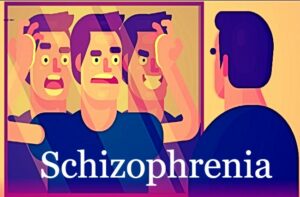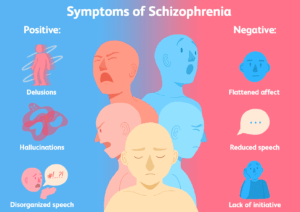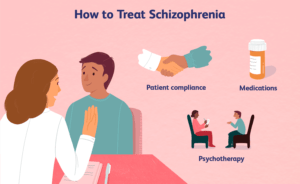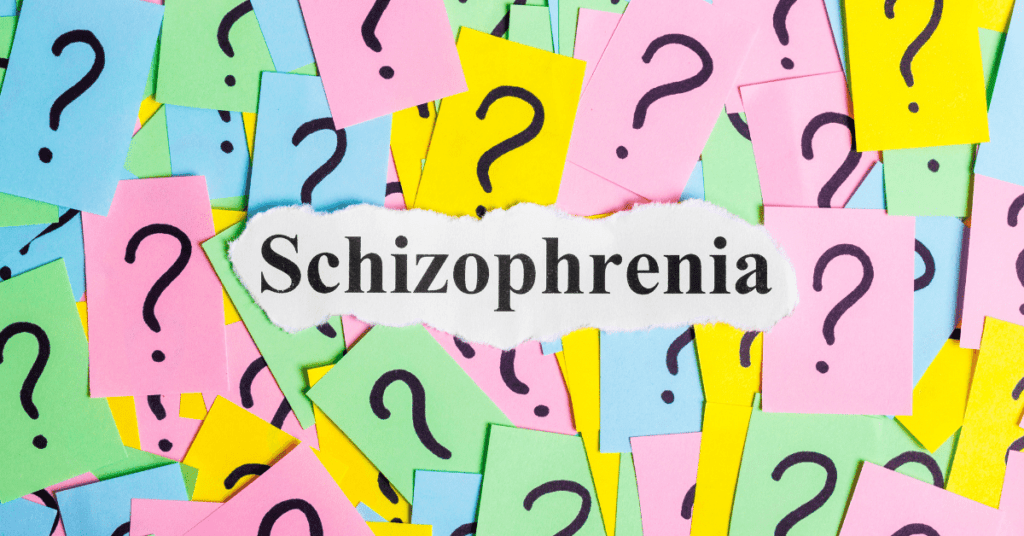Contents
What Is Schizophrenia?

Schizophrenia is a term used to describe a mental illness that causes people to lose touch with reality in some capacity. The symptoms that manifest in people diagnosed with schizophrenia vary from person to person; it is likely, however, for someone dealing with this disorder to be unable to tell what is reality and what is not. Therefore, how to deal with schizophrenia becomes a typical question.
People with schizophrenia may see or hear things that don’t exist, believe things that are not true, or feel emotions that are not based on reality. They also may have trouble thinking logically and organizing their thoughts, making it difficult to communicate clearly. In addition, people with schizophrenia often have problems with motivation and self-care.
There is no single cause of schizophrenia, though the disorder seems to be caused by a combination of factors including genetics, environment, and brain chemistry. The good news is that schizophrenia is treatable; with proper care and support, people with this disorder can lead healthy and productive lives.
If you or someone you know is struggling with schizophrenia, there are a few things you can do to help. Firstly, it is important to seek professional help. A mental health professional can provide diagnosis and treatment for schizophrenia and other mental health disorders.
Schizophrenia Symptoms
Schizophrenia signs and symptoms typically fall into four categories: positive (or more-notable), negative (less-common), cognitive (memory/thinking problems), and mood. Its symptoms are usually mild, but symptoms may worsen if left untreated. These symptoms can include: hallucinations and delusions and disorganized speech and behavior.

- Positive signs of schizophrenia include hallucinations, delusions, disorganized thinking and speech, and agitation.
- Negative signs of schizophrenia include blunted or flat affect (emotions), social withdrawal, poverty of speech, and problems with hygiene.
- Cognitive signs of schizophrenia include problems with attention span, memory, and abstract thinking.
- Mood signs of schizophrenia can be either depression or manic.
Outlook And Prognosis
Schizophrenia is a serious mental illness that can affect how people think, feel, and act. Although schizophrenia has some very troubling symptoms and an unclear course of treatment, it is treatable with the right medication and therapy. With treatment, many patients lead healthy productive lives. There are no abnormalities in how a person’s brain is physically built or how it works in people who have schizophrenia compared to those who don’t. The cause remains unknown, but it is likely that several things come together to produce the illness.
The National Alliance on Mental Illness (NAMI) estimates that more than 3 million Americans are diagnosed with schizophrenia each year worldwide. However, this estimate is likely to be below. The symptoms of schizophrenia are often misunderstood by the public and considered to be untreatable. Because it can’t be seen or diagnosed with a blood test or brain scan, many people who have not received treatment for schizophrenia believe that they do not have an illness at all.
Schizophrenia Statistics
The average age of onset for schizophrenia is in the early 20s
- About 1 percent of the population will be diagnosed with schizophrenia at some point in their lives.
- Schizophrenia affects men and women equally.
- There is no known single cause for schizophrenia, but the disorder is believed to be caused by a combination of genetics, environment, and brain chemistry.
- People with schizophrenia are more likely to commit suicide than people without the disorder.
- The National Alliance on Mental Illness (NAMI) estimates that more than 3 million Americans are diagnosed with schizophrenia each year worldwide.
Effects Of Schizophrenia

The course of schizophrenia is highly variable: Some people have only one episode in their lifetime, while others have multiple episodes throughout their lives
Most individuals with schizophrenia are not dangerous; less than 10 percent of people living with this illness will ever harm another person (excluding suicide)
Over 20 percent of individuals with schizophrenia attempt suicide at least once during their lifetime
Many people who have schizophrenia also suffer from other mental illnesses, such as depression or anxiety. This can make their symptoms and treatment more complicated
People with schizophrenia often require long-term treatment and support to manage the illness. However, with the right help, many people living with schizophrenia are able to lead healthy, productive lives. There are many helpful resources available for those affected by this illness, including support groups and mental health professionals. With time, patience, and love, those living with schizophrenia can learn how to better manage their symptoms and how to cope with the challenges of the disorder.
How To Deal With Schizophrenia?

Living with schizophrenia can be difficult, but it is possible to manage the illness and live a fulfilling life. With the right resources and support, those affected by schizophrenia can learn how to cope with the challenges of this disorder.
One of the most important things that family members and friends can do is offer support and understanding. It is important not to take on too much responsibility, and to remember that the person with schizophrenia is still the same person, just with a serious illness.
It is also helpful to talk openly and honestly about the illness and to encourage treatment and medication compliance. Be patient and understanding, but also take breaks when you need them. Try not to take the person’s behavior personally; it is a symptom of the illness, not a reflection on your relationship.
It is also important to remember that how you deal with schizophrenia is unique to each person and situation. What works for one person may not work for another. Don’t make promises you can’t keep or agree to anything that doesn’t feel right to you. You should also try to get educated about schizophrenia and how to best support the person you love.
Schizophrenia: Tips for Family Members

It is important that family members and friends provide support and understanding when a loved one is struggling with schizophrenia. The key is not to take on too much responsibility and to remember that the person with schizophrenia is still the same person, just with a serious illness.
- Remember that schizophrenia is a real and serious illness
- Do not take on too much responsibility; let the person with schizophrenia manage their own life as much as possible
- Be supportive and understanding; offer help when needed, but don’t push
- Talk openly and honestly about the illness
- Encourage treatment and medication compliance
- Understand that there is no one “right” way to deal with schizophrenia and that what works for one person may not work for another
- Take care of yourself; be patient and understanding, but also take breaks when you need them (and try to do something rewarding for yourself each day)
- Try not to take the person’s behavior personally; it is a symptom of their illness, not a reflection on your relationship
- Don’t make promises you can’t keep and don’t agree to anything that doesn’t feel right to you
- Get educated about schizophrenia and how to best support the person you love
- Seek out support groups or counseling for yourself; it can be helpful to talk to someone who understands what you’re going through
- With time, patience, and love, people dealing with schizophrenia can learn how to manage their symptoms, how to regain control of their lives, and how to successfully cope with the challenges that come along with this disorder.
Coping With Symptoms of Schizophrenia
Schizophrenia is a serious mental illness that affects how a person thinks, feels, and behaves. It can be very challenging to live with schizophrenia, but with the right resources and support, it is possible to manage the illness.
There are many helpful resources available for those affected by schizophrenia, including support groups and mental health professionals. It is important to get educated about schizophrenia and how to best support the person you love.
If you are caring for someone with schizophrenia, it is also important to take care of yourself. Be patient and understanding, but also take breaks when you need them. Try not to take the person’s behavior personally; it is a symptom of their illness, not a reflection on your relationship. Seek out support groups or counseling for yourself; it can be helpful to talk to someone who understands what you’re going through. In addition, there are many helpful resources available to people with schizophrenia and their families. Support groups can be a great way to connect with others in similar situations.
Treatment For Schizophrenia
 There are many different treatments for schizophrenia. The type of treatment that someone can get will depend on how their symptoms affect them and how severe they are. Psychotherapy and medication may be helpful in controlling symptoms and improving quality of life. Family and friend support is also an important part of how to treat schizophrenia.
There are many different treatments for schizophrenia. The type of treatment that someone can get will depend on how their symptoms affect them and how severe they are. Psychotherapy and medication may be helpful in controlling symptoms and improving quality of life. Family and friend support is also an important part of how to treat schizophrenia.
Psychotherapy is a type of counseling that can help people with schizophrenia understand and cope with their thoughts and feelings. A patient can take this type of therapy on an individual basis or in a group setting.
Doctors often prescribe medication to people with schizophrenia to help control their symptoms. There are many different types of medication for the treatment of schizophrenia. And the medications will adjust overtime to find the best treatment for each individual.
The goal of medication is not to cure schizophrenia, but rather to help manage symptoms and improve quality of life. Antipsychotic medications can be effective in reducing hallucinations and delusions, while antidepressant medication may be helpful in treating some negative symptoms. It is important that people with schizophrenia work with a doctor to find the right treatment for them.
Family and friend support is also an important part of how to treat schizophrenia. It can be helpful to talk openly about how it affects your life, and how you deal with schizophrenia.
Conclusion
If you or someone in your family is dealing with schizophrenia, it’s important to know how best to deal with schizophrenia. Schizophrenia can be a debilitating disorder that impacts how people think and behave. It usually starts between the ages of 16-30 years old though some cases may present earlier than this age range. One way to deal with schizophrenia is by finding treatment for symptoms like hallucinations (hearing voices), delusions (unusual beliefs, ideas), and disorganization in thinking/behavior patterns. There are many different types of treatments available including medication, therapy, lifestyle changes, and even electroconvulsive therapy. This shows how to help reduce symptoms associated with psychosis when other options have failed. If any of these sounds like they might apply to you or someone that you know, talk to a health care professional like a psychiatrist.
If you are looking for affordable Online Counseling MantraCare can help: Book a trial therapy session


